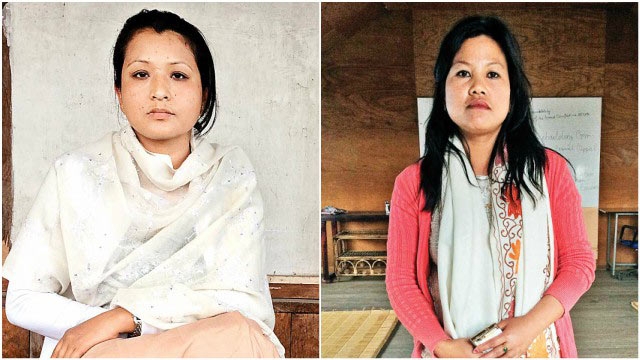
On April 6, 2007, Mung Hangzo of Kokaithan locality in Imphal stepped out to the local market barely half a kilometre from his house. The day was Good Friday, and the counsellor at an NGO, working for the rehabilitation of those affected by drug addiction, wanted to buy a camera.
He met two friends on a scooter, and started riding with them. They were stopped by the police, and one of the men, who was allegedly high on a drug called SP, threw his handkerchief laden with the drug in a ditch nearby.
The police immediately fired at them, instantly killing the friend riding pillion. The impact threw the trio off balance and they fell into the ditch. When the police reached them, they were all alive.
“I was alone at home with my 11-month-old son when I heard gunshots at around 9.40 am. Killings were routine, and gunshots were not new to us,” says Renu Takhelambam, Mung’s wife. A lady in the locality came home to tell her that Mung has been shot at. But Renu did not know that her husband was dead when she went to the hospital.
Renu’s case is one of the 1,528 cases that form part of a Supreme Court PIL, filed by the Extrajudicial Execution Victims Families Association (EEVAM), Manipur, and Human Rights Alert (HRA) in 2013. Renu is the president of EEVAM. The apex court held that these cases be investigated, and asserted that army personnel cannot use excessive force under the controversial Armed Forces Special Powers Act (AFSPA).
These cases are also a poll plank on which the BJP is trying to gather momentum in the conflict-ridden northeastern state, where the Congress is facing mounting criticism regarding incumbency. In a “chargesheet” that the BJP released early this month of the Congress’ 15-year-old “misrule”, the party reminded the state’s people about Chief Minister Okram Ibobi Singh’s comment of “haatpa nattana upai leite” (elimination is the only option) at the state Assembly. The BJP, in its vision document, also vowed to investigate these cases.
Yet, unsurprisingly, the BJP’s poll documents make no mention of AFSPA. And surprisingly, the Congress has vowed to remove the “disturbed area” tag from the state.
What coincides with all this is the further investigation of the cold-blooded fake encounter of Chungkham Sanjit and Rubina at the Bir Tikendrajit Road in 2009, in which the CBI had filed a chargesheet. Following Manipur Police head constable Thounaojam Herojit’s confession about the killings in January last year, Sanjit’s mother Chungkham Taratombi approached the Manipur High Court to reopen the investigations. The HC moved the petition to the sessions court, and investigations were restarted early this week.
Babloo Loitongbam of the HRA, which documented the 1,528 cases in the last 20 years, says that the frequency of extra-judicial had been increasing, and in 2003, there was a quantum leap in these killings. “It peaked in 2008, and after the fake encounter of Sanjit and Rubina were exposed by Tehelka in 2009, there was a brief lull,” he said.
“The then home minister P Chidambaram visited Manipur and congratulated the armed forces, saying that the numbers show their good work. I lashed out at the government on a TV channel the next day, following which the brother of a man killed in a fake encounter came to meet me,” he recalls.
During the meeting, they decided to speak to as many affected people as possible. “On July 11, 2009, among several rounds of tea, the women who gathered here let out their tears along with their testimonies. We could not do anything, we could only cry,” he says.
That’s how EEVAM began, along with a small self-help group for the women started with the prize money from the awards conferred on Irom Sharmila.
Most of these women are young widows, and with a case of militancy registered in the names of their equally-young, but dead, husbands, none of these women make the cut for the widow pension scheme. Their children are not eligible for state-sponsored scholarships.
Edina Yeikhom, who lost her husband in 2008, says that under the shadow of AFSPA, the armed forces usually pick up gallantry awards for nabbing “militants”. “This is a lucrative cycle of violence, and it will most likely never end,” she says.
She saw her husband last on July 31, 2008, when he left home around 10 am. By 5.30pm, local news channels carried the news of his encounter.
“They took him to a place 30 miles away from Imphal, and tortured him in the fields the whole day, and shot him in the evening. When I went to the place later, I saw boulders with flesh on them,” she says.
Edina went into shock and was paralysed for two years. She was the secretary at EEVAM, but had to give the post up due to her illness. Today, she devotes her time to EEVAM and runs a shop. Her two children are in a boarding school. “It’s been such a long time; I love my husband a lot. We will carry this fight to its end,” she says.
Source: DNA India


